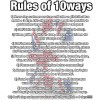This article addresses five of the most common tricks companies use to part us with our money.
Did you ever wonder why you buy things you don’t need, who is really making the decision to buy, and where does all of that money go? Well, it turns out that marketers have been studying the human brain for decades in order to answer these questions.
Marketing companies spend billions each year focusing on 5 key areas in their marketing strategies:
- Show people pictures of beautiful models with expensive clothes and accessories.
- Make people feel unhappy about their life so they will be motivated to change it (Buy more stuff)
- Discourage people from thinking critically by disguising ads as news articles.
- Conditioned responses by rewarding consumers when they buy a product or engage with a brand.
- Convince people that the advertised products are the only way to solve their problems.
Companies use various methods of advertising to appeal to our emotions, wearing down our ability for self-control, and making us feel like we need their product in order to be happy.
Firstly, using beautiful models can render consumers into a trance and give them an emotional response that is beneficial to marketers. This weakens our self-control and makes us more likely to buy things we don’t need because it has been illustrated as desirable through attractive visuals and buying gives us instant gratification.
Secondly, unhappy consumers tend to blame themselves for not being successful enough and blame their unhappiness on the fact that they aren’t shopping often enough or aren’t buying enough things. This convinces them that buying more stuff is going to solve their problems and can boost their self-esteem. They also won’t think critically about the purchase because they don’t want to feel responsible for not being happy or successful enough. People dislike their own lack of success and happiness, which reinforces a cycle of buying more things because they think doing so will make them happier.
Thirdly, advertising companies disguise ads as news articles by blurring the line between editorial content and advertisements. Blurred lines make consumers less able to discern what material is from a trustworthy source and makes it more likely that people will be influenced by what they see online rather than fact-checking or ignoring them entirely.
Fourthly, conditioning occurs when a consumer is rewarded for engaging with a brand through social media or getting discounts. Once conditioned, consumers are more likely to engage with brands because they feel as though they’re being rewarded and it becomes habit-forming.
Lastly, marketers convince customers that their products are the only way to solve problems by emphasizing benefits over features. For example, an advertisement might say “Solve your acne problem” rather than “This face soap has natural ingredients which helps clear up acne”. Whilst the product does have these qualities, the emphasis on them makes people less critical of what they see and will buy it without thinking twice about what other alternatives exist or whether those ‘benefits’ could be achieved through means that don’t involve buying the product.


























![Google are paying up to £30 for your [Scottish / English or Welsh] voice](https://10ways.com/wp-content/uploads/2016/08/4aug3-100x100.jpg)


